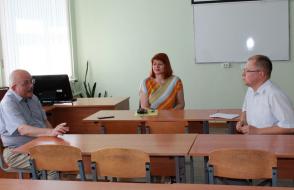Alexander Velikorodnov, Senior Assistant for Program Activities of the Office of the United Nations High Commissioner for Refugees in the Republic of Belarus (UNHCR) visited our university on June 11. During the meeting with the vice-rector for scientific work, professor O.M. Demidenko and Dean of the Faculty of Philology E.N. Poluyan, they discussed issues related to the continuation of language training for refugees on the basis of the educational institution "F. Skorina State University" with the aim of their successful socialization in Belarus. Courses of Russian as a foreign language for refugees and stateless persons was started on the basis of the GSU named after F. Skorina in September 2012 within the framework of the international technical assistance project “Integration of refugees in Belarus, Moldova and Ukraine”. They are being carried out at the present time.
With the financial support of the European Union and the assistance of the UNHCR the 1st building of the GSU named after F. Skorina was equipped with a study room for teaching Russian to foreign citizens. The classroom has computers with Internet access, a multimedia projector and a printer. Russian language classes have been held for refugees from various countries for eight years. The courses were attended by immigrants from Syria, Iran, Iraq, Afghanistan, Sri Lanka, Cuba, Tajikistan, Pakistan, Georgia, Somalia, and others. The permanent head of the courses all these years is associate Professor of the Department of Russian, General and Slavic linguistics, Candidate of Philological Sciences Strizhak Artem Leonidovich.
A distinctive feature of the organization of the educational process for adult refugees is the constant change in the number of students. First of all, this is reflected in the regular addition of new students to the group, whose levels of Russian language proficiency differ significantly. During the classes, the main attention is paid to the development and consolidation of oral communication skills, the ability to navigate in various situations. Students are given the necessary lexical minimum. Typical communication situations are analyzed based on texts and dialogues. Various textbooks and computer programs are used for teaching Russian. Special difficulties are caused by teaching refugees who do not speak Russian even at a minimum level, because such a situation requires an individual approach to each student. At present moment, due to the adverse epidemic situation, classes are held remotely, using Internet technologies, which leaves its imprint on the features of the educational process.
During the conversation, the sides expressed their gratitude to the UNHCR for its long-term fruitful cooperation and identified steps for further continuing joint activities in the field of teaching Russian to refugees and stateless persons, as well as their successful socialization in Belarusian society.











